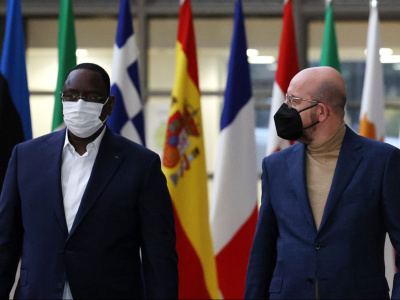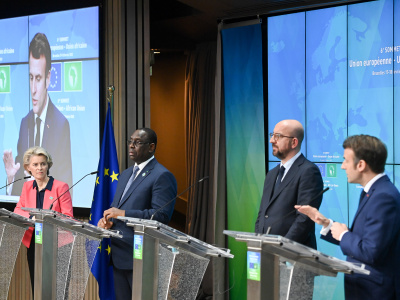
G20 in Hamburg and the migration agenda: How changing US policies are affecting global discussions
Ahead of the G20 in Hamburg, Noemi Cascone and Anna Knoll discuss how changing US policies are affecting global discussions.
Barely in power, President Trump has started his long-term plan to enforce stricter immigration laws delivering on his campaign promises. These include increasing the number of deportations of undocumented migrants, building his (in)famous wall on the Mexico-US border, and reducing refugee admissions.
As the G7 Taormina Summit has shown, Trump’s stark policy change is also impacting global discussions on migration governance. At the upcoming G20 Summit in Hamburg, global leaders will have a new chance to discuss concrete commitments to manage migrant flows. The outcome of this Summit will reveal the future of the global migration agenda and the ability of the EU to shape it.
While some of Trump’s new visa and migration policies have encountered setbacks – i.e. his executive order temporarily restricting travel from six Muslim-majority countries had initially been blocked by US judges yet with the US Supreme Court recently allowing partial implementation -the first repercussions are already visible.
For example, following a lowering of the ceiling for resettlement places, refugee admissions to the US in the first months under Trump have dropped significantly compared to the same period in 2016 and have reduced by nearly half in comparison with the last months of the Obama administration. Cuts in aid and foreign peace and security missions have also been announced.
The 2017 G7 Summit in the Sicilian town of Taormina has been an emblematic example of these challenges. The summit – symbolically organised in Sicily, the main transit region for migrants coming to Europe – represented one of the first opportunities for world leaders to witness the implications of Trump’s more restrictive agenda in the area of migration, development aid and support to security and peace.
The Italian hosts had put much hope into finding common solutions to Europe’s Mediterranean migration challenges and aimed to put migration at the heart of the G7 discussions. While European countries have themselves struggled to define a joint comprehensive and forward-looking approach to migration during the past months, US priorities certainly had a strong impact on narrowing down the G7 approach from a standalone statement on human mobility promoting legal channels to a watered-down two-paragraph version in the final G-7 communiqué.
The result is disappointing. While the Taormina Summit did recognise the urgency of the migration situation, it failed to produce any concrete solution to remedy this so-called ‘crisis’ and to actually protect refugees and other migrants. The declaration stresses the sovereign right of states ‘to control their own borders and to establish policies in their own national interest and national security’, but it does little to advance real efforts to share responsibilities for refugee protection or to complement existing approaches to migration with creative legal pathways to reduce irregular migration.
As a long-term solution, it highlights the need to support refugees as close to their home countries as possible and to address underlying drivers of irregular migration reflecting a common narrative found in EU policies. Responsibility sharing is emphasised mainly with regards to return schemes, protection of the most vulnerable, enforcing border control and enhancement of law enforcement. While being certainly important elements, these instruments alone, without proper legal channels, are unlikely to help reduce irregular migration and human smuggling, possibly exposing migrants to even riskier journeys.
These developments raise a number of questions for the EU and more broadly for global discussions on migration.
A ripple effect?
The G20 Summit at the end of this week, on 7-8 July, will be an important occasion to present an ambitious new strategy for migration governance. It is set to address the same topics that the G7 group has not managed to agree on, including climate change, free trade, migration and refugee protection.
The key question will be how G20 states will deal with the existing deep divisions on these issues. A concern is that US disengagement on refugee protection as well as the restrictive approach adopted by some EU countries could create a ripple effect.
Yet, the EU and Germany want the Summit to be a success. The strategy has been to highlight that the current mixed-migration flows through the Mediterranean require global solidarity. This is precisely the ingredient that has been lacking in Europe. Italy is continuing its diplomatic effort to increase pressure and achieve concrete contributions from EU member states at G20 preparation meetings, so far with limited success.
Stepping up the game?
The withdrawal of the US from leadership on resettlement and migration should provide an additional incentive to overcome ongoing differences within the EU. Calls to increase efforts on joint EU resettlement and to provide legal pathways – at least for refugees – have been mounting from both political, academic and UN actors.
Yet, this might be possible for a coalition of willing EU member states, rather than for the block as a whole. Additional incentives could come from the realisation that advancing on return and readmission with partner countries requires a more open stance on a variety of legal pathways for broader mobility and migration.
So far very few EU member states have adopted new bilateral efforts to facilitate the mobility of young Africans the past couple of years. The upcoming EU-Africa Summit, which will discuss opportunities for youth as well as migration, would be a perfect opportunity to show higher ambitions and translate existing commitments into practice.
Spearheading joint action?
The outcomes of the G20 will set the scene for the upcoming Global Compact negotiations for Refugees and for Migration at the UN level. The timing is far from ideal since the experience with migration governance and refugee protection in the past few years, including the underwhelming result of the G7 in Taormina, showed that the negotiations are going to be challenging, to say the least.
Yet, there are signs of progress. There might still be the opportunity to build the kind of ‘mini-multilateralism’ and coalitions that could spearhead practical joint action as suggested by former UN Special Representative on International Migration, Peter Sutherland. The G20 in its 2016 Declaration acknowledged that labour migration brings benefits to economies and societies. G20 members ready to act on this insight can start building legal pathways, skills partnerships and enhanced resettlement options alongside fully implementing the current policy responses. This would help better address irregular migration in the coming years.
The views expressed here are those of the authors and not necessarily those of ECDPM.




